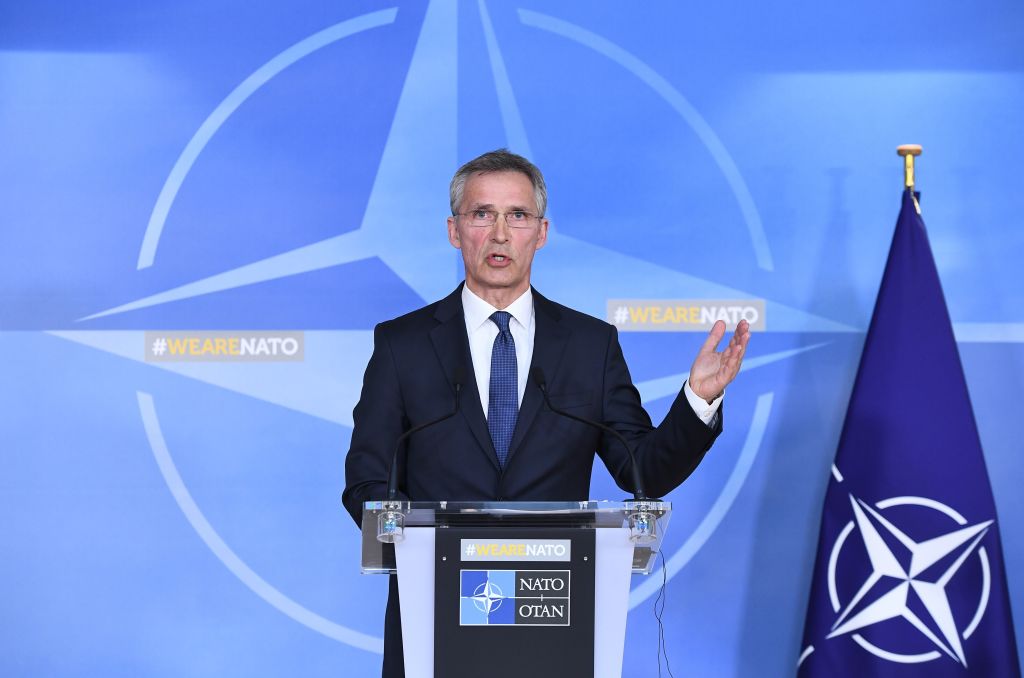NATO secretary general says to fight climate change, alliance will adapt operations, reduce military emissions


A free daily email with the biggest news stories of the day – and the best features from TheWeek.com
You are now subscribed
Your newsletter sign-up was successful
NATO Secretary General Jens Stoltenberg sees climate change as "a defining challenge for our generation and a crisis multiplier," and wants the alliance to play a key role in understanding the best way to fight it while also adapting operations and reducing military emissions, he writes in Politico Europe.
Stoltenberg says climate change is "making the world a more dangerous place." Rising sea levels and extreme weather are "devastating communities, increasing competition for scarce resources, and fueling tensions and conflict," he added. "That's why it's so crucial that NATO sets the gold standard on climate change and security, and then takes action to address it. Climate change threatens global security, so NATO must be part of the response."
On Thursday, Stoltenberg attended the U.S. Leaders Summit on climate change at the invitation of President Biden and Defense Secretary Lloyd Austin. NATO allies agreed to an "ambitious agenda on climate and security" in February, Stoltenberg said, and he expects NATO leaders to approve an action plan at a summit later this year.
The Week
Escape your echo chamber. Get the facts behind the news, plus analysis from multiple perspectives.

Sign up for The Week's Free Newsletters
From our morning news briefing to a weekly Good News Newsletter, get the best of The Week delivered directly to your inbox.
From our morning news briefing to a weekly Good News Newsletter, get the best of The Week delivered directly to your inbox.
The plan would task NATO with using its "unique capacities and expertise to monitor and track climate change," Stoltenberg said, investing in more research and sharing data. NATO soldiers and equipment are facing extreme heat and cold, with critical infrastructure also exposed — the Pentagon has found that climate change threatens the naval base in Norfolk, Virginia, which also houses NATO commands.
There will be an assessment of the impact of climate change on NATO assets and installations, Stoltenberg said, and training and exercises will be adapted. NATO will also decrease its dependence on fossil fuels and prioritize sustainable technologies. "Climate change is a generational challenge that requires a global solution, and NATO is a powerful platform for Europe and North America to tackle shared security challenges together," Stoltenberg said.
A free daily email with the biggest news stories of the day – and the best features from TheWeek.com
Catherine Garcia has worked as a senior writer at The Week since 2014. Her writing and reporting have appeared in Entertainment Weekly, The New York Times, Wirecutter, NBC News and "The Book of Jezebel," among others. She's a graduate of the University of Redlands and the Columbia University Graduate School of Journalism.
-
 6 of the world’s most accessible destinations
6 of the world’s most accessible destinationsThe Week Recommends Experience all of Berlin, Singapore and Sydney
-
 How the FCC’s ‘equal time’ rule works
How the FCC’s ‘equal time’ rule worksIn the Spotlight The law is at the heart of the Colbert-CBS conflict
-
 What is the endgame in the DHS shutdown?
What is the endgame in the DHS shutdown?Today’s Big Question Democrats want to rein in ICE’s immigration crackdown
-
 The plan to wall off the ‘Doomsday’ glacier
The plan to wall off the ‘Doomsday’ glacierUnder the Radar Massive barrier could ‘slow the rate of ice loss’ from Thwaites Glacier, whose total collapse would have devastating consequences
-
 Can the UK take any more rain?
Can the UK take any more rain?Today’s Big Question An Atlantic jet stream is ‘stuck’ over British skies, leading to ‘biblical’ downpours and more than 40 consecutive days of rain in some areas
-
 As temperatures rise, US incomes fall
As temperatures rise, US incomes fallUnder the radar Elevated temperatures are capable of affecting the entire economy
-
 The world is entering an ‘era of water bankruptcy’
The world is entering an ‘era of water bankruptcy’The explainer Water might soon be more valuable than gold
-
 Climate change could lead to a reptile ‘sexpocalypse’
Climate change could lead to a reptile ‘sexpocalypse’Under the radar The gender gap has hit the animal kingdom
-
 The former largest iceberg is turning blue. It’s a bad sign.
The former largest iceberg is turning blue. It’s a bad sign.Under the radar It is quickly melting away
-
 How drones detected a deadly threat to Arctic whales
How drones detected a deadly threat to Arctic whalesUnder the radar Monitoring the sea in the air
-
 ‘Jumping genes’: how polar bears are rewiring their DNA to survive the warming Arctic
‘Jumping genes’: how polar bears are rewiring their DNA to survive the warming ArcticUnder the radar The species is adapting to warmer temperatures
